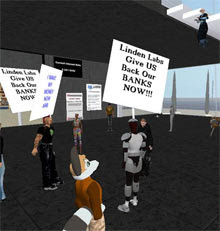So that's why the people are milling about* down below. They're demanding CBDC's.
From the Bank for International Settlements:
Legitimacy, Privacy, Integrity, Choice: Towards a legal framework for central bank digital currencies
Speech by Mr Agustín Carstens, General Manager of the BIS, at the BIS Innovation Hub-Financial Stability Institute conference on legal aspects of central bank digital currencies, Basel, Switzerland, 27 September 2023.
Introduction
Good morning and welcome to today's conference. We are all looking forward to a stimulating discussion of the important legal questions that must be addressed if central bank digital currencies (CBDCs) are to become a core part of monetary systems, whether in wholesale or retail form.Importance of CBDC
Before addressing the legal issues, I would like to talk about CBDCs more fundamentally.A key role, perhaps the key role, of central banks is to provide money for society. Currently, they do this primarily through the provision of cash and central bank reserves. In practice, these account for only a small share of the money used by the public. The bulk of it consists of commercial bank money, in the form of bank deposits. Even so, central banks play a pivotal role in ensuring the public's trust in money. It is this trust that makes commercial bank money useful as a means of payment in our societies.
Central banks create trust in several ways. They regulate and supervise the payments system. They control the economy's unit of account. They provide for settlement finality. And the central bank also underpins the solvency of the banking system as a whole. As lender of last resort, the central bank provides emergency liquidity to the system and mitigates against potential bank runs.
Taken together, these actions uphold confidence in the safety and value of money. They ensure that a dollar is a dollar, a euro is a euro and, here in Basel, that a franc is a franc, whether that dollar, euro or franc is a banknote or a deposit.
This apparently simple concept – the "singleness of money" – is extremely important. If singleness were ever to be in doubt, people would run for cash. Individual banks – and ultimately the whole system – would be under threat. And relatedly, central banks guarantee the finality of settlements in central bank money, providing assurance that transactions are final and irrevocable, even if parties to the transaction go bankrupt or fail.
As the defender of the value of money, central banks have a responsibility to ensure that money is available in forms that meet society's needs and expectations.
The current monetary system, based on cash and commercial bank money, continues to serve society well.
But it needs to evolve. Cash use is declining.1 Users are increasingly demanding new forms of money. Advances in digital services are highlighting shortcomings in existing systems, while raising expectations about what money should do. People want their money to be digital and programmable. They want to be able to transfer it across borders quickly, cheaply and safely.The private sector has sought to meet these demands by issuing new forms of private money. Examples include unbacked cryptocurrencies and stablecoins. While they have achieved some popularity as speculative investments, these financial instruments are not money. They do not offer the backing and protection of the central bank; a reliable regulatory and supervisory framework; access to the central bank as lender of resort; or guaranteed finality of payments. Even stablecoins do not assure a stable value. They do not and cannot meet the standards the public expects of money....
....Ummm, this is beginning to sound like Second Life. I hope we don't see a repeat of 2008's "BANK RUN: 'Second Life Closes Banks'":
From MIT's Technology Review:
Bank run: After Linden Lab’s Tuesday announcement that it was banning virtual banks in Second Life, some residents rushed to withdraw their virtual Linden dollars, while others (above) protested the company’s decision.
Credit: Prokofy Neva (a.k.a. Catherine Fitzpatrick)
Last seen in "Money in the Metaverse" and "The Fleecing of the Avatars".
